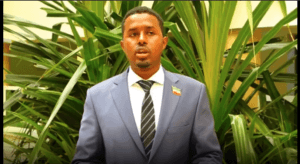Official: UAE regrets minister’s claim on deal with Somali govt
A statement issued by the spokesman of the northwestern region’s leader, Mohamoud Warsame Jama, said that a visiting UAE delegation made up of 12 members conveyed their country’s regret for the assertion made by the State Minister For Foreign Affairs, Anwar Gargash.
 Mohamoud Warsame Jama, Muse Bihi’s spokesman
Mohamoud Warsame Jama, Muse Bihi’s spokesman
By The Star Staff Writer
MOGADISHU— The United Arab Emirates will issue official statement on the recent claim made by one of its ministers who said that its military and trade deals with Somali politicians in the north were the result of understandings with previous Somali administrations.
A statement issued by the spokesman of the northwestern region’s leader, Mohamoud Warsame Jama, said that a visiting UAE delegation made up of 12 members conveyed their country’s regret for the assertion made by the State Minister For Foreign Affairs, Anwar Gargash.
“The (United Arab) Emirates delegation has shown to the president that as a country it regretted the erroneously translated statement of the state minister, saying that it will respond in an official, written statement,” said the statement.
Gargash has recently told the BBC Arabic Service that his country had only cut deals with Somali politicians in the northwestern region after reaching “understandings” with previous Somali governments.
“The understandings (between us and previous Somali governments) were clear. The political understanding was to support a united Somalia,” Gargash said. “We don’t have a consulate in Somaliland, nor do we have an embassy there.” The northwestern region calls itself Somaliland, a designation that is not recognized by the international community.
The Somali government denies having any knowledge of such understandings. Officials from previous administrations have also denied being party to any military or trade deal with UAE.
The United Arab Emirates’ unilateral agreements to run the port of Berbera and establish a military base there have sparked a bitter diplomatic tension between Abu Dhabi and Mogadishu.
Somalia’s national government rejected the deals as violation of its sovereignty, while the United Arab Emirates still maintains that they’re binding.
The Somali parliament has last month invalidated the deals and barred the UAE’s DP World from operating in the Horn of Africa nation.
Somalia was particularly angered when the port of Berbera deal allowed Ethiopia to control a 19 percent stake, while DP World got a 51 per cent stake. Somalia had only a 30 percent share.
Last month, Somalia took its protest to the United Nation Security Council, asking the world body to take action against the Emirates for violating its sovereignty.
The statement said the UAE pledged to support the region’s army “in terms of equipment and training” to strengthen the region’s security.
The delegation, the statement said, also confirmed to local leaders that the Gulf state will “buy Somaliland’s livestock that will be exported directly to them.”
“The leadership of the (United) Arab Emirates has shown their country’s determination to strengthen the longstanding relationship between the two countries, Somaliland and (United) Arab Emirates,” said the statement.
The UAE’s move in the northeastern region is set to further strain the already frosty relationship between the Gulf state and the Somali national government.
